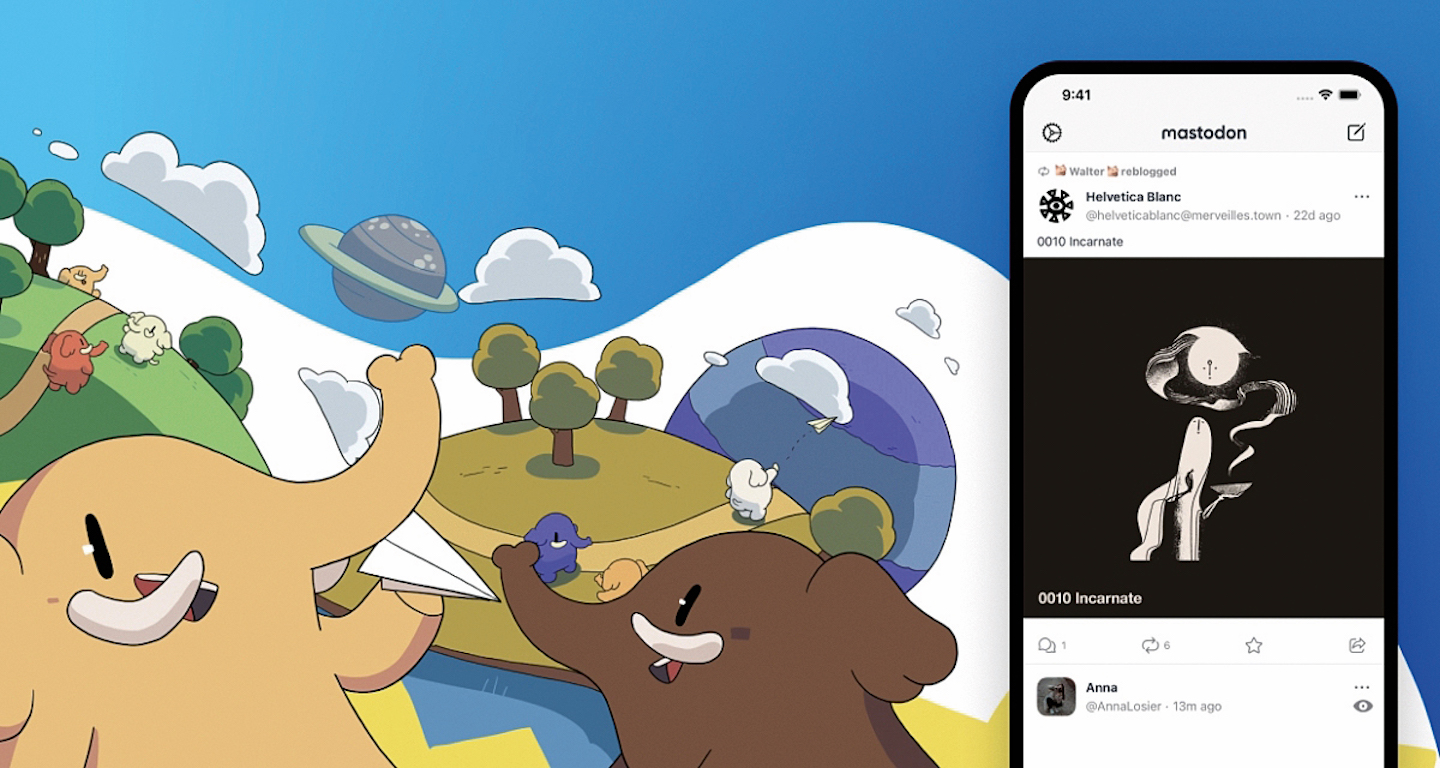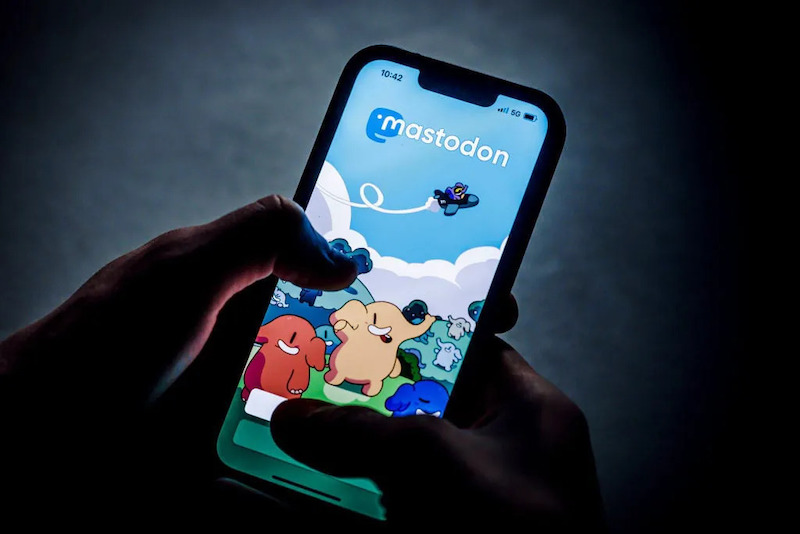
The Berlin-based social network named after the extinct tusked animal, has emerged as the next best microblogging alternative (Photo: Mastodon)
Once upon a time, God ate a pineapple pizza and thought it was good. This is not a pious foray into the contentious realm of Hawaiian offerings, but rather a regular musing by God Pod, the wisecracking comedy-satire account that dispenses “divine wisdom” on Facebook and, more recently, Mastodon. The latter, a Berlin-based social network named after the extinct tusked animal, has emerged as the next best microblogging alternative after free speech absolutist Elon Musk, who closed his US$44 billion (RM198.37 billion) blockbuster deal to own Twitter, went on a firing frenzy and scattered hints that spell a return for Donald Trump.
At Mastodon, which does not operate under the watchful eye of a demagogical billionaire, you can perform the unthinkable: Assume full autonomy and decision-making power on how the platform functions and safely evangelise the abomination (or, as some say, delicacy) of a fruit-topped pizza without being condemned.
eugen.jpeg

Does this mean we can pack our views and ship them off to social media utopia? It is possible, if Mastodon were not harder to decipher than the facial expressions of Lord Morpheus in the TV adaptation of Sandman (its author Neil Gaiman is on Mastodon too). First, a little backstory: Mastodon founder and software developer Eugen Rochko started an open-source project in 2016 out of a prescient fear that Twitter would one day be besieged by a tech autocrat (check!), populated by extremists (check!) and beset by issues of content moderation (check!). The 29-year-old found the solution in the fediverse, or federated universe, in which interconnected servers form a network for social media, blogging and file hosting. To put it simply, Mastodon is an assemblage of connected chat rooms that are independently operated and moderated in what the community calls a federation.
How is the purple mammoth different from the blue bird? You will first pick a server and then a username, which together generate your address just as Outlook or Gmail would. Some servers cater to specific interests — art, music, activism, journalism, food, the environment and more — but for newbies like us, mstdn.social with 75,000 users is a noteworthy starting point for general chatter without being restricted to a certain topic. Each server polices itself, the idea being that local regulation can be quicker and more efficient than a centrally administered body patrolling giant brands like Twitter or Meta. On the plus side, you will have almost twice as many characters (500) to write a post should you decide to debate the need for an Avatar sequel.
neil_gaiman_also_on_mastodon.jpeg

If you are already on Reddit or Discord, chances are you are already on Mastodon as their operating systems fare quite similarly while still peddling familiar features that allow you to follow people and gain followers. The equivalent of Twitter’s “Retweet” is a “Boost” here, while a “Tweet” is a “Toot”, which sounds profoundly silly. But who gets the last laugh now that the platform has racked up two million active users to date? Despite having been around for six years, Mastodon’s meteoric rise in recent months stems from its pledge to forbid malicious speech, ban ads, eschew revenue and abdicate hands-on control over the network. Twitter’s recent exodus, of both users and employees, has translated into an opportunity for Mastodon to serve as a life raft to escape the toxic slurry.
While technically anyone can set up a Mastodon server, most users have found the network to be left-leaning. Steps are complicated and require self-hosting a website as well as a virtual computer system connected to the internet and an email provider. The advantage of open source, however, is that the code behind the platform is available to the public and is maintained by any individual who wants to run one. In short, “my server, my rules”.
mastodon_phone.jpg

The curated social space may have created a unified global experience without being controlled by one entity but the paradox is that the person who runs your server has access to everything you do there, including snooping on your private toots or deleting your account for any reason. The boon, but also the bane, of a decentralised platform is that every server has its own set of rules, which makes content moderation subject to the admins of that server. It is also wise to forgo the direct-message function for now as messages are not end-to-end encrypted, which can easily lead to security and privacy breaches. Heavily sanitised sites on Mastodon also run the risk of becoming an echo chamber of sorts as homogenous ideologies can overamplify political righteousness and correctness. Moreover, its design nature has made it difficult to fund as it is a volunteer project that is largely developed by one person.
Yet, Mastodon’s timely ascent is a salve, especially amid the online drama over Musk’s move to impose a US$8 monthly fee for those who want a blue tick by their name to indicate a verified account. Minority and disadvantaged groups, which advocate for not just freedom of speech but also workplace ethics, feminism and all forms of human rights, have a safe haven to take refuge, a feature sorely lacking on its twittering counterpart which has been used by the world’s richest man to troll us all.
The commercialisation that has plagued most networks is absent at Mastodon, where no ads vie for your eyeballs or algorithms mess with the feed chronology to increase engagement and keep you addicted. More significantly, it harks back to the early days of social media, when it was exciting to discover new people, bounce ideas off each other and consult the crowd for advice.
mastodon_phone.jpg

To be fair, it will be an uphill battle to lure mass users away from Twitter, let alone dethrone it, simply because it is where everyone is. Back home, where else could a photo of a prime minister-in-waiting getting a haircut go viral if not on the Twitterverse first? How else would we have kept ourselves entertained during GE15 if not for the 4.4 million Malaysian users who speak the internet’s most famous language: memes? And that shot of Muar MP Syed Saddiq Syed Abdul Rahman being hoisted in the air by a hunky gentleman, as if he had just won a Manchester United game? Mhm.
Mastodon still has teething problems, but it poses a collective chance to re-learn what we need and want from our digital personas. And this time, freeing the bird will not be enough.
This article first appeared on Dec 5, 2022 in The Edge Malaysia.


